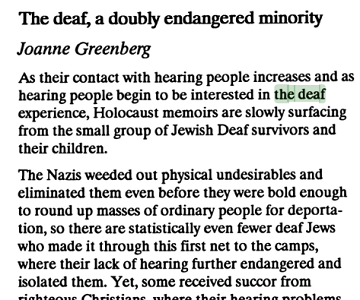
[EDITOR’S NOTE: This article appeared in Sh’ma, a journal of Jewish responsibility, 22/432 April 17, 1992]
Joanne Greenberg
Sh’ma
As their contact with hearing people increases and as hearing people begin to be interested in the deaf experience, Holocaust memoirs are slowly surfacing from the small group of Jewish Deaf survivors and their children.
The Nazis weeded out physical undesirables and eliminated them even before they were bold enough to round up masses of ordinary people for deporta-tion, so there are statistically even fewer deaf Jews who made it through this first net to the camps, where their lack of hearing further endangered and isolated them. Yet, some received succor from righteous Christians, where their hearing problems were an even greater source of danger than what existed for their hearing compatriots. In fact, almost all of the deaf Jews who survived the Holocaust were those hidden by righteous Christians. False papers might have been given to a hearing Jew, and the ruse often worked, but once deafness was discovered, the deaf person, papers or not, was eliminated. In two cases I have heard of, young deaf people joined resistance movements but their work always had to keep them away from situations requiring speech or understanding speech.
How did the Nazis establish ‘deafness’? Since the condition is invisible, boards of inquiry administered a series of quick, crude tests, and, luckily, the crudeness of these tests allowed a number of deaf people to pass as hearing. If the suspect’s lip-reading was good enough, he might fake the answers, and since the questions came from a central source and were standardized, the answers were passed around the deaf community and learned by heart. Deaf people and their hearing parents and friends drilled the required words of the answers until they were pronounced well enough to pass.
An unforeseen result of this was the importation of the Oral Only (speech and lip-reading) system of Deaf Education into the United States as a legitimate educational method, complete with justifying theory. It resulted in a thirty year freeze during whichi no school in this country taught Sign Language, and the language of the deaf was used by the students in spite of their teachers’ and school policy. There were enough believers in eugenics and the disposal of ‘constitutional inferiors’ here in America to make American Deaf people acutely conscious of their tenuous status. The ‘To Endure, Be Obscure’ motto that Jews used during the thirties and forties was applicable to deaf people and doubly applicable to the Jewish Deaf, for whom the churches were not the; sources of sanctuary and succor they were for the restt, of the deaf population. Many churches welcomed Jews as objects of proselytism and since, until very recently, almost all deaf culture activity was in J churches, the Jew who wanted to remain a Jew was a very isolated being indeed.
Their perilous position in Germany during World War II, and their marginal position in America until very recently, may also help to explain why so many Jewish Deaf are Right-to-Lifers and violently opposed to abortion.
The thaw has come at last and in the new ethnic consciousness in America, Deaf Americans are identifying themselves as a subculture and not a handicapped population. Deaf people are writing memoirs, demonstrating for their rights, and generally taking their places in the national dialogue.
For Deaf Jews also, this new opening has resulted in the searching out and encouraging of the memories of Holocaust survivors. Memoirs, oral (translated) , and videotaped, of aging parents are being made and Holocaust experiences are being written by interested and informed second parties, or in English and other languages by bi-lingual deaf people themselves.
As documents that explore the limits of heroism and depravity, endurance, love and greed, wit and survival, cruelty and triumph, many of these accounts are unmatched. Gallaudet University (800 Florida Avenue NE, Kendall Green, Washington, DC 20002) publishes The Deaf American. They have gathered and printed some of these accounts, and they are not only of interest to the Holocaust student, but also are a tribute to the incredible courage and capacity to endure of those who sheltered those deaf people at infinite risk to themselves and their families.
JOANNE GREENBERG is a writer living in Golden, Co. and a Sh’ma Contributing Editor.
Source: Rabbi David Maharam/Bob Katz





